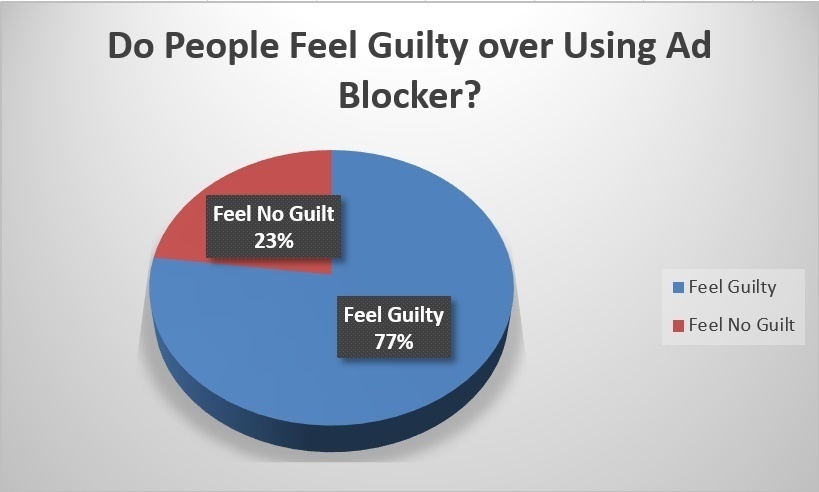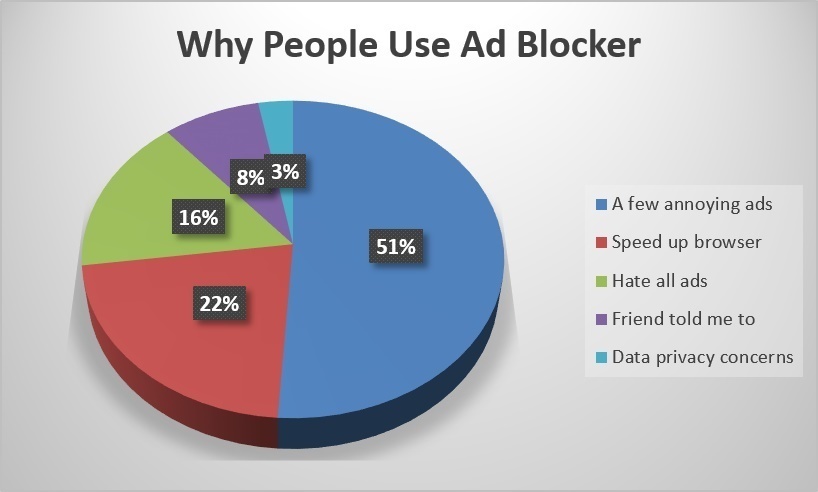77% of users feel guilty for blocking online advertising

In the past couple of years, blocking online advertising has become one of the main topics of discussion among advertisers and online media professionals. The fact is, locking is becoming commonplace for so many users. If 10 years ago, the blockers installed only the most advanced guys (that is, we are with you), now it has become a trend for ordinary users. Among young people aged 18-24, an absolute majority of ad blockers are now using - for them, this is simply a new social norm, standard. The man who has advertising banners on the computer is flashed by milleniali with pity, because this is a lamer and UG.
Experts continue to argue how to treat this. An interesting survey was conducted by the company Gladly, the developer of the ad blocker Goodblock . This is a very strange blocker that blocks all advertising on the Internet, but shows one cool ad per day.
However, the point is not in the original Goodblock work model, but in the results of the survey that Gladly conducted among its users. It turned out that 77% of blockers using advertisements feel some guilt before the creators of sites that are deprived of a source of funding.
')

These survey results are contrary to the generally accepted opinion that users of ad blockers are cynical and unscrupulous scum who don't care about their neighbors, they even download the file from the torrents immediately leave the distribution.
Not at all. These people are not alien to human feelings. Most understand that blocking ads totally is not very good, and therefore creates a “white list” of exceptions - those sites where ads are not blocked.
The survey involved 243 people. Users were asked for what main reason they installed an ad blocker. More than half of the respondents answered that the main reason was a small amount of annoying advertising. That is, due to the small number of the most invasive banners, all decent site creators suffer, who do not “wave a member at the screen” at all, but culturally show a themed banner in the corner.
Only 16% of users said that they “hate all advertising” in principle.
Every fifth uses a blocker to speed up the browser.

So, 77% of users admitted that they feel some guilt for blocking ads. Interestingly, exactly 77% of users said they’ve whitelisted one or more sites. Coincidence? Does not look like it.
In fact, there are favorite sites on which to block ads is simply a sin. Is someone blocking banners with Jimmy Wales on Wikipedia? Probably, such a person has absolutely no conscience.
Among those who keep the white list, most of them contributed only 1-4 sites to it.

It is also interesting to know for what reason users add a site to the “white list” and disable advertising on it. This is often done by coercion - users say that the site does not work if you do not deactivate the blocker. Recently, such methods of forcibly disconnecting blockers have become popular with content resources. Even Facebook recently declared war on the blockers and (so far unsuccessfully) is trying to embed advertising in the news feed bypassing the blockers .
So, 41% of users disable the blocker purely under duress (this is the main reason). But 58.5% of people disconnect a blocker of goodwill simply because they want to support their favorite resource. Another 0.5% of users, that is, 1 out of 235 of all survey participants, said that he disconnects the blocker on the site in the white list mainly because advertising is useful to him.
It is interesting to look at the list of sites that are most often whitelisted by Goodblock users. Still, the sites that force visitors to watch ads (Forced) prevail among them.

People have mixed feelings about sites that make them watch ads. 56.8% tend to think that sites really need money and tend to help them. But 31.3% said they are angry - and less come to sites with forced advertising.
As mentioned above, for the Millennials 18-24 years old there are other rules in general. For them, ad blocking is a social norm. Young people have a particular hatred for video advertising, including the one that is shown at the beginning of some YouTube videos.
And of course, due to the blocking of video ads on YouTube, all other sites suffer.
Source: https://habr.com/ru/post/355148/
All Articles